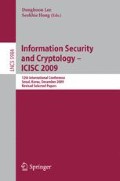Abstract
Minimizing complexity of group key exchange (GKE) protocols is an important milestone towards their practical deployment. An interesting approach to achieve this goal is to simplify the design of GKE protocols by using generic building blocks. In this paper we investigate the possibility of founding GKE protocols based on a primitive called multi key encapsulation mechanism (mKEM) and describe advantages and limitations of this approach. In particular, we show how to design a one-round GKE protocol which satisfies the classical requirement of authenticated key exchange (AKE) security, yet without forward secrecy. As a result, we obtain the first one-round GKE protocol secure in the standard model. We also conduct our analysis using recent formal models that take into account both outsider and insider attacks as well as the notion of key compromise impersonation resilience (KCIR). In contrast to previous models we show how to model both outsider and insider KCIR within the definition of mutual authentication. Our analysis additionally implies that the insider security compiler by Katz and Shin from ACM CCS 2005 can be used to achieve more than what is shown in the original work, namely both outsider and insider KCIR.
Access this chapter
Tax calculation will be finalised at checkout
Purchases are for personal use only
Preview
Unable to display preview. Download preview PDF.
References
Bresson, E., Chevassut, O., Pointcheval, D., Quisquater, J.J.: Provably authenticated group Diffie-Hellman key exchange. In: CCS 2001: Proceedings of the 8th ACM conference on Computer and Communications Security, pp. 255–264. ACM, New York (2001)
Bresson, E., Chevassut, O., Pointcheval, D.: Provably Authenticated Group Diffie-Hellman Key Exchange - The Dynamic Case. In: Boyd, C. (ed.) ASIACRYPT 2001. LNCS, vol. 2248, pp. 290–309. Springer, Heidelberg (2001)
Bresson, E., Chevassut, O., Pointcheval, D.: Dynamic Group Diffie-Hellman Key Exchange under Standard Assumptions. In: Knudsen, L.R. (ed.) EUROCRYPT 2002. LNCS, vol. 2332, pp. 321–336. Springer, Heidelberg (2002)
Katz, J., Yung, M.: Scalable Protocols for Authenticated Group Key Exchange. In: Boneh, D. (ed.) CRYPTO 2003. LNCS, vol. 2729, pp. 110–125. Springer, Heidelberg (2003)
Bresson, E., Manulis, M.: Securing Group Key Exchange against Strong Corruptions. In: Proceedings of ACM Symposium on Information, Computer and Communications Security (ASIACCS 2008), pp. 249–260. ACM Press, New York (2008)
Katz, J., Shin, J.S.: Modeling insider attacks on group key-exchange protocols. In: Proceedings of the 12th ACM Conference on Computer and Communications Security CCS 2005, pp. 180–189. ACM, New York (2005)
Bohli, J.M., Gonzalez Vasco, M.I., Steinwandt, R.: Secure group key establishment revisited. Int. J. Inf. Sec. 6(4), 243–254 (2007)
Gorantla, M.C., Boyd, C., González Nieto, J.M.: Modeling Key Compromise Impersonation Attacks on Group Key Exchange Protocols. In: Jarecki, S., Tsudik, G. (eds.) PKC 2009. LNCS, vol. 5443, pp. 105–123. Springer, Heidelberg (2009)
Cramer, R., Shoup, V.: Design and analysis of practical public-key encryption schemes secure against adaptive chosen ciphertext attack. Technical report (2002), http://shoup.net/
Smart, N.P.: Efficient Key Encapsulation to Multiple Parties. In: Blundo, C., Cimato, S. (eds.) SCN 2004. LNCS, vol. 3352, pp. 208–219. Springer, Heidelberg (2005)
Gorantla, M.C., Boyd, C., Nieto, J.M.G.: On the Connection Between Signcryption and One-Pass Key Establishment. In: Galbraith, S.D. (ed.) Cryptography and Coding 2007. LNCS, vol. 4887, pp. 277–301. Springer, Heidelberg (2007)
Boyd, C., Cliff, Y., Gonz´alez Nieto, J.M., Paterson, K.G.: One-Round Key Exchange in the Standard Model. International Journal of Applied Cryptography 1(3), 181–199 (2009)
Boyd, C., Mathuria, A.: Protocols for Authentication and Key Establishment. Information Security and Cryptography. Springer, Heidelberg (August 2003)
Boyd, C., González Nieto, J.M.: Round-Optimal Contributory Conference Key Agreement. In: Desmedt, Y.G. (ed.) PKC 2003. LNCS, vol. 2567, pp. 161–174. Springer, Heidelberg (2002)
Boyd, C.: Towards a classification of key agreement protocols. In: The Eighth IEEE Computer Security Foundations Workshop CSFW 1995, pp. 38–43. IEEE Computer Society, Los Alamitos (1995)
Boyd, C.: On Key Agreement and Conference Key Agreement. In: Mu, Y., Pieprzyk, J.P., Varadharajan, V. (eds.) ACISP 1997. LNCS, vol. 1270, pp. 294–302. Springer, Heidelberg (1997)
Bohli, J.M., Steinwandt, R.: Deniable Group Key Agreement. In: Nguyên, P.Q. (ed.) VIETCRYPT 2006. LNCS, vol. 4341, pp. 298–311. Springer, Heidelberg (2006)
Bresson, E., Manulis, M.: Contributory Group Key Exchange in the Presence of Malicious Participants. IET Information Security 2(3), 85–93 (2008)
Bresson, E., Chevassut, O., Essiari, A., Pointcheval, D.: Mutual Authentication and Group Key Agreement for Low-Power Mobile Devices. In: Proc. of MWCN 2003, October 2003, pp. 59–62 (2003)
Al-Riyami, S.S., Paterson, K.G.: Tripartite Authenticated Key Agreement Protocols from Pairings. In: Paterson, K.G. (ed.) Cryptography and Coding 2003. LNCS, vol. 2898, pp. 332–359. Springer, Heidelberg (2003)
Gorantla, M.C., Boyd, C., Nieto, J.M.G., Manulis, M.: Generic One Round Group Key Exchange in the Standard Model. Cryptology ePrint Archive, Report 2009/514 (2009), http://eprint.iacr.org/
Cramer, R., Shoup, V.: A Practical Public Key Cryptosystem Provably Secure Against Adaptive Chosen Ciphertext Attack. In: Krawczyk, H. (ed.) CRYPTO 1998. LNCS, vol. 1462, p. 13. Springer, Heidelberg (1998)
Canetti, R., Halevi, S., Katz, J.: Chosen-Ciphertext Security from Identity- Based Encryption. In: Cachin, C., Camenisch, J.L. (eds.) EUROCRYPT 2004. LNCS, vol. 3027, pp. 207–222. Springer, Heidelberg (2004)
Furukawa, J., Armknecht, F., Kurosawa, K.: A Universally Composable Group Key Exchange Protocol with Minimum Communication Effort. In: Ostrovsky, R., De Prisco, R., Visconti, I. (eds.) SCN 2008. LNCS, vol. 5229, pp. 392–408. Springer, Heidelberg (2008)
Author information
Authors and Affiliations
Editor information
Editors and Affiliations
Rights and permissions
Copyright information
© 2010 Springer-Verlag Berlin Heidelberg
About this paper
Cite this paper
Gorantla, M.C., Boyd, C., González Nieto, J.M., Manulis, M. (2010). Generic One Round Group Key Exchange in the Standard Model. In: Lee, D., Hong, S. (eds) Information, Security and Cryptology – ICISC 2009. ICISC 2009. Lecture Notes in Computer Science, vol 5984. Springer, Berlin, Heidelberg. https://doi.org/10.1007/978-3-642-14423-3_1
Download citation
DOI: https://doi.org/10.1007/978-3-642-14423-3_1
Publisher Name: Springer, Berlin, Heidelberg
Print ISBN: 978-3-642-14422-6
Online ISBN: 978-3-642-14423-3
eBook Packages: Computer ScienceComputer Science (R0)

